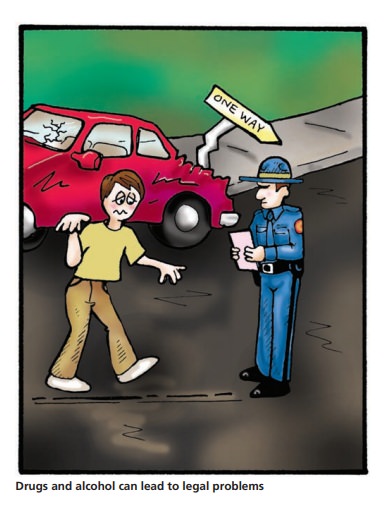Chapter: Psychiatric Mental Health Nursing : Substance Abuse
Types of Substance Abuse
TYPES OF SUBSTANCE ABUSE
Many substances can be used and abused; some can be obtained
legally, whereas others are illegal. This discussion includes alcohol and
prescription medications as sub-stances that can be abused. Abuse of more than
one sub-stance is termed polysubstance
abuse.
The Diagnostic and
Statistical Manual of Mental Disor-ders, 4th edition, Text Revision (DSM-IV-TR) lists 11 diag-nostic classes
of substance abuse:
·
Alcohol
·
Amphetamines or Similarly Acting Sympathomimetics
·
Caffeine
·
Cannabis
·
Cocaine
·
Hallucinogens
·
Inhalants
·
Nicotine
·
Opioids
·
Phencyclidine (PCP) or Similarly Acting Drugs
·
Sedatives, Hypnotics, or Anxiolytics
It also categorizes substance-related disorders into two groups:
(1) those that include disorders of abuse and dependence and (2)
substance-induced disorders such as intoxication, withdrawal, delirium,
dementia, psychosis, mood disorder, anxiety, sexual dysfunction, and sleep
disorder.
Intoxication is use of a substance that
results in mal-adaptive behavior. Withdrawal
syndrome refers to the negative psychologic and physical reactions that
occur when use of a substance ceases or dramatically decreases. Detoxification is the process of safely
withdrawing from a substance. The
treatment of other substance-induced dis-orders such as psychosis and mood
disorders is discussed in depth in separate section.
Substance abuse can be defined as using a
drug in a way that is inconsistent
with medical or social norms and despite negative consequences. The DSM-IV-TR distin-guishes substance abuse
from dependence for purposes of medical diagnosis. Substance abuse denotes
problems in social, vocational, or legal areas of the person’s life, whereas substance dependence also includes
problems associated with addiction
such as tolerance, withdrawal, and unsuc-cessful attempts to stop using the
substance. This distinc-tion between abuse and dependence frequently is viewed
as unclear and unnecessary (Jaffe & Anthony, 2005) because the distinction
does not affect clinical decisions once withdrawal or detoxification has been
completed. Hence, the terms substance
abuse and substance dependence or
chemical dependence can be used
interchangeably.

Related Topics